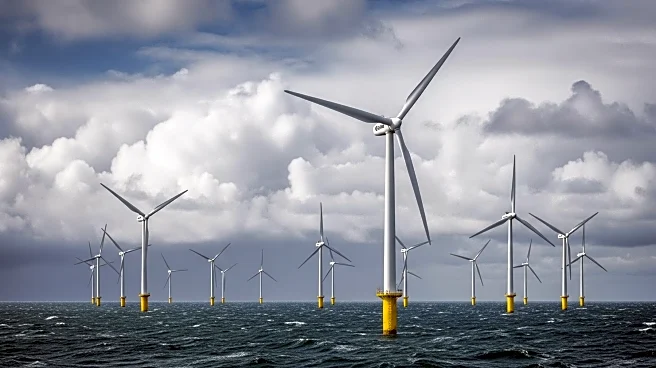What is the story about?
What's Happening?
Maine's offshore wind industry is progressing despite political uncertainties and misinformation. Jack Shapiro, climate and clean energy director for the Natural Resources Council of Maine, emphasizes the importance of offshore wind projects in the Gulf of Maine. The state has proposed a 144 MW floating wind demonstration project and sold four commercial leases in October 2024, indicating strong developer confidence. These projects are located over 50 miles from the mainland, minimizing visual impact and property value concerns. Offshore wind is seen as a potential economic boost, aligning with Maine's maritime heritage and promising utility bill savings for residents.
Why It's Important?
The development of offshore wind in Maine is crucial for transitioning to cleaner energy sources and reducing reliance on fossil fuels. This shift is expected to lower electricity prices and generate significant economic benefits, including job creation and wholesale market savings. The industry also aims to protect marine ecosystems by adhering to high standards for siting and operations. Despite misinformation linking offshore wind to whale mortality, scientific evidence points to other threats like vessel strikes and climate change. The industry's growth could help mitigate climate change impacts and support Maine's economy.
What's Next?
Future steps involve ensuring offshore wind projects avoid prime fishing grounds to minimize impacts on the fishing industry. The bipartisan support for Maine's offshore wind bill, which excludes Lobster Management Area 1 from leasing, highlights efforts to balance clean energy development with fishing interests. Developers will need to incorporate strong wildlife protections during construction and operations. As misinformation persists, stakeholders are encouraged to seek information from trusted sources and approach social media narratives with skepticism.
Beyond the Headlines
The offshore wind industry's expansion in Maine reflects broader trends in clean energy adoption and the challenges posed by fossil fuel interests. The misinformation campaign against offshore wind underscores the need for public education and transparent communication. The industry's success could serve as a model for other regions facing similar energy transition challenges, emphasizing the importance of equitable distribution of benefits and burdens across communities.














